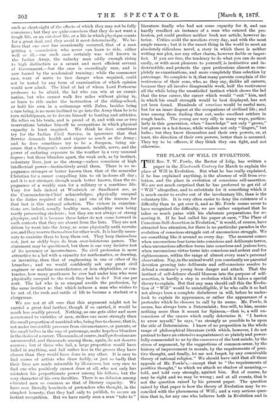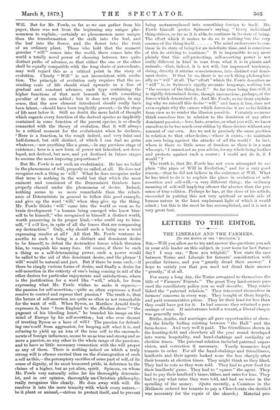THE PLACE OF WILL IN EVOLUTION.
TRERev. T. W. Fowls, the Rector of Islip, has written a paper in the Nineteenth Century for March to explain the place of Will in Evolution. But what he has really explained, if he has explained anything, is the absence of will from evo- lution, and the place in evolution of conscious self-assertion. We are not much surprised that he has preferred to get rid of " Will " altogether, and to substitute for it something which it is much easier to evolve out of the involuntary life, than is the voluntary life. It is very often easier to deny the existence of a difficulty than to get over it, and as Mr. Fowls seems never to have recognised the difficulty, we are rather surprised that he takes so much pains with his elaborate preparations for re- moving it. If he had called his paper at once, "The Place of Conscious Self-Assertion in Evolution," it would, of course, have attracted less attention, for there is no particular paradox in the evolution of conscious struggle out of unconscious struggle. We see something like it around us every day. The moment comes when unconscious fear turns into conscious and deliberate terror, when unconscious affection turns into conscious and jealous love, when unconscious virtue turns into conscious and ardent zeal for righteousness, within the range of almost every man's personal observation. Nay, in the animal world you constantly see parental devotion growing into deliberate and self-conscious resolve to defend a creature's young from danger and attack. That the instinct of self-defence should blossom into the purpose of self- assertion, is hardly a step in evolution which it takes a special theory to explain. But that any man should call this the Evolu- tion of "Will" would be unintelligible, if he who calls it so had not always been a complete disbeliever in will, before he under- took to explain its appearance, or rather the appearance of a pretender which he chooses to call by its name. Mr. Fowle, it seems, has always been a Determinist ; free-will, to him, means nothing more than it meant for Spinoza,—that is, a will un- conscious of the causes which really determine it. "I hasten to avow myself," he says, "as strongly as possible to be upon the side of Determinism. I know of no proposition in the whole range of philosophical literature (with which, however, I do not pretend to have an extensive acquaintance) so plainly and power- fully commended to us by the consensus of the best minds, by the stress of argument, by the suggestions of common-sense, by the history of improvement in morals, by the requirements of posi- tive thought, and finally, let me not forget, by any conceivable theory of rational religion." We should have said that all these appeals of Mr. Fowle's,—except that to "the requirements of positive thought," to which we attach no shadow of meaning,— told, and told very strongly, against him. But of course, he may be right and we may be wrong ; and at all events, that is not the question raised by his present paper. The question raised by that paper is how the theory of Evolution may be re- conciled with the phenomena of Will ; and a very serious ques- tion that is, for any one who believes both in Evolution and in
Will. But for Mr. Fowle, so far as we can gather from his paper, there was not from the beginning any unique phe- nomenon to explain,—certainly no phenomenon more unique than the transformation of the stalk into the leaf, and the leaf into the flower, and the flower into the fruit of an ordinary plant. Those who hold that the moment genuine " will " comes into the world, there comes into the world a totally novel power of choosing between two quite distinct paths of advance, so that either the one or the other shall be equally compatible with the long chain of antecedents, may well regard this as a critical point in the story of evolution. Clearly " Will " is not inconsistent with evolu- tion. The principle of evolution only requires that the as- cending scale of life should wind upwards in a line of gradual and constant advance, each type containing the higher functions of that next beneath it, with something peculiar of its own added; but it does not require, in any sense, that the new element introduced should really have been latent, —should have been implicitly present, —in the stage of life next below it. Still no doubt the mere habit of thought which regards every function of the derived species as implicitly contained in some function of the parent species, is so closely connected with the theory of evolution, that it will always be a critical moment for the evolutionist when he declares, Here is a function, in the rough indeed, and very faint and half-formed, but still distinct, of which I can find no germ whatever,—nor anything like a germ,—in any previous stage of existence ; here is a new form of power not inherited, not deve- loped, not derived, but new, and yet destined in future stages to assume the most imposing proportions ?'
But Mr. Fowle is not such an evolutionist. He has no belief in the phenomena of will, properly so called, at all. He does not recognise such a thing as will.' What he does recognise under that term is nothing in the world but that which the most eminent and consistent of the Determinist thinkers have properly classed under the phenomena of desire. Indeed, nothing seems to us more remarkable than the reluct- ance of Determinists in general to follow this good example, and give up the word when they give up the thing. Mr. Fowle thinks 'will' came into the world so soon as by brain development "a human being emerged who knew him- self to be himself," who recognised in himself a distinct world, worth preserving in its proper kind,—who could say to him- self, "I will live, in spite of all the forces that are compassing my destruction." Only, why should such a being use a word expressing resolve at all ? All that Mr. Fowle ventures to ascribe to such a being is a distinct and dominant desire to be himself, to defeat the destructive forces which threaten him, to vanquish his many foes. Of course, if there be such a thing as a self-determining power, such a power would be called to the aid of this dominant desire, and the phrase 'I will' would be natural and just. But if there be none such,—if there be simply various forms of desire, and finally a desire for self-assertion in the entirety of one's being coming in aid of the other desires for particular enjoyments and satisfactions, where is the justification for a word like "will," which, far from expressing what Mr. Fowle wishes to make it express,— the passion for self-assertion,—quite as often expresses a fixed resolve to control and repress that passion ? The truth is, that the heroes of self-assertion are quite as often as not remarkable for the want of will. When Byron, as Matthew Arnold finely expresses it, bore "from England to the 2E tolian shore" "the pageant of his bleeding heart," he branded his image on the mind of Europe by his self-assertion ; but who ever dreamt of treating Byron as a hero of will? The passion for defend- ing one's-self from aggression, for keeping self what it is, and refusing to yield up an iota of the true self to the encroach- ments of foreign influences, seems to us as true and strong and as mere a passion, as any other in the whole range of the passions, and to have as little necessary connection with the will proper as any of them. There is nothing indeed on which a truly strong will is oftener exerted than on the disintegration of such a self as this,—the peremptory sacrifice of some part of self, of its sense of dignity, of its most treasured pride, in deference to the claims of a higher, but as yet alien, spirit. Spinoza, on whom Mr. Fowle very naturally relies for his thoroughly determin- ist, and in our opinion, thoroughly un-Christian philosophy, really recognises this clearly. He does away with will. He resolves it into the mere tenacity with which every nature,— be it plant or animal,—strives to protect itself, and to prevent being metamorphosed into something foreign to itself. Mr. Fowle himself quotes Spinoza's saying, "Every individual thing strives, so far as it is able, to continue in its state of being. The effort which it makes to do so is nothing but the very
essence of the thing itself The mind endeavours to con- tinue in its state of being for an indefinite time, and is conscious of this its striving to continue." It is impossible to say more plainly that this self-protecting, self-asserting power is not really different in kind in man from what it is in plants and animals,—that, indeed, it is not will, but impressed tendency, rising, directly it attains consciousness, into distinct and domi- nant desire. If that be so, there is no such thing philosophic- ally as "will" at all. The" effort" which Mr. Fowle describes as " will " is, in Spinoza's rigidly accurate language, nothing but "the essence of the thing itself." So far from being free-will, it is rigidly determined desire, though unconscious, perhaps, of the forces which determined it. And Mr. Fowle, so far from explain- ing why we miscall this desire "will," and fancy it free, does not even explain why the causes which determine it are so far hidden from view as to render the illusion possible. Certainly we never think ourselves free in relation to the dominion of any other dominant passion,—love, hate, avarice, or what you will; we know ourselves to be too much over-ridden by these desires without any consent of our own. Are we not in precisely the same position in relation to that other desire,—where it exists,—to maintain our own being against the attacks of all the world ? In fact, where is there so little sense of freedom as there is in a man who says, "I cannot act as you advise, for my whole being loathes and protests against such a course ; I could not do it, if I would " ?
The truth is, that Mr. Fowle has not even attempted to ex- plain "the place of Will in Evolution," and for a very good reason,—that he did not believe in the existence of Will. What he has tried to do is to explain the place in evolution of self- assertion and self-will,—a very different thing ; the ordinary meaning of self-will implying oftener the absence than the pre- sence of true volition. Perhaps he has, at the close of his article, succeeded in putting this not very spiritual or noble side of human nature in the least unpleasant light of which it would admit ; but this is the most he has accomplished, and it is not a very great feat.



































 Previous page
Previous page